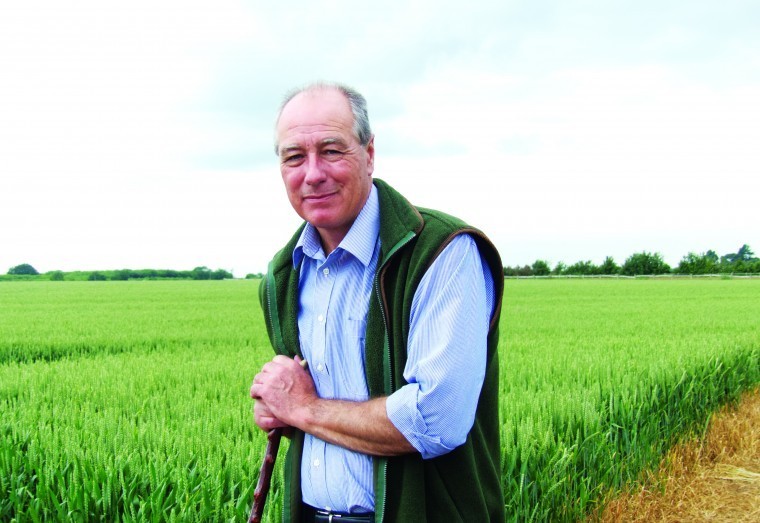January has brought some variation on the weather theme with the first 10 days bringing 75 millimetres of rain and while the ground has been wet since August now it is absolutely saturated. Just as it seemed we were going the way of the north of England it has turned cold and dryer for 10 days.
Crops have not really done much. Oilseed has seen the lush growth knocked back by the frosts. With the cold conditions we have completed spraying-off charlock with Fox and with a series of frosts post application expect to see reasonable results even though some of the charlock plants were in bud waiting to flower. Luckily the oilseed has yet to show any bud so should be safe from any effects.
The wheat crops have certainly suffered a shock and many are yellow from the low temperature and, in some cases, the levels of disease that are present from the long mild autumn. Most diseases are present, with some of the older varieties such as Claire showing far more disease than the newer ones such as Zulu. Perhaps we are seeing the swansong of one of the oldest varieties on the recommended list. I know we can clear it up with a robust T0 application. But with the shifting sensitivity of disease to fungicides, moving to more resistant varieties while the resistance is effective must be the correct approach.
I cannot say pigeons have been much of a problem so far this winter and we are two thirds of the way through January. However rabbit damage on oilseed crops has been significant in places and it has actually given pigeons an entry point to land and feed exacerbating the problem. Shooting at night has obviously been hampered by the wet ground conditions. Wheat generally has kept on growing and compensating for any rabbit grazing in all but the worst places.
With little else changing in fields the big issues for farming in early 2016 are not crop and livestock related. Basic payment scheme payments are no doubt concerning many farmers and bank managers as cash flows are impacted by late payment.
However we do know they will turn up eventually and the Rural Payments Agency (RPA) has actually managed to fulfil its promise of more than 50% of claimants paid by the end of December 2015, or near enough. So a majority was achieved albeit in terms of numbers of applications rather than value.
The RPA have continued to make progress during January and depending on what exactly a “vast majority” means in Mark Grimshaw’s public sector vocabulary I suspect they will be thereabouts by the end of January. Unfortunately that leaves somewhere around 20% of applicants who have received a letter informing them that payments will be into February and beyond. The cause may be inspections, mistakes, commons, probate etc but for those affected the wait may be protracted and next year’s application forms or invites to apply on line will drop through the letter box in March starting the whole process again with the big digital push back on. My own view is that considering the reversion to paper applications and moving the application deadline back a month the RPA have done surprisingly well. They are not yet over the finishing line and it is no consolation for those who may yet wait a long time but it could be a lot worse and the RPA pre Mark Grimshaw’s tenure proves it.
The other issue is of course going to be Europe and by the time we get to the referendum we will all be bored with the debate. Having mentioned farming support above one should start with the stated positions of all the main UK parties on wanting to see the common agricultural policy abolished post 2020 and any support targeted on delivery of environmental goods. If there is a £9 billion saving from Brexit then without a firm commitment from government – and that means George Osborne – then farming should not be expecting the current £3 billion pounds that comes in agricultural support from Europe to be maintained post exit.
In today’s markets that £3 billion of support accounts for 55% of UK total income from farming. Then it comes down to trade and competitiveness. So trade will depend on the terms we can continue to access Europe, currently our main trading partner in food and drink, where 38% of British lamb goes and 12.8 billion of agri food products. No doubt trade deals would be possible but where does agriculture rank when we are talking about access to Europe for the financial services sector or car production?
Access to our markets for agricultural products from Europe will doubtless be the price for access to Europe for the UK’s more “important” sectors. Will we be competitive without the subsidies that will continue in Europe? Will we even have the labour to harvest and pack our horticultural crops without access to labour from Europe? There are a number of issues specific to our industry that need answers for an informed decision.
What we do know is that George Osborne, a man who often criticises Europe for not being competitive, has through the living wage announcement committed to increasing the wages for anyone over 25 from the current minimum wage level by 35% over the next five years. For any labour intensive business in the UK without the ability to pass the cost increase on he is putting those businesses at risk. So would you trust Mr Osborne to stand up for British agriculture in negotiations abroad or give us a fair deal at home? I think not. Remaining as a part of the biggest trading block in the world with all of its infuriating regulating ways seems more attractive to me, but then of course that is what Cameron and Osborne want anyway.




